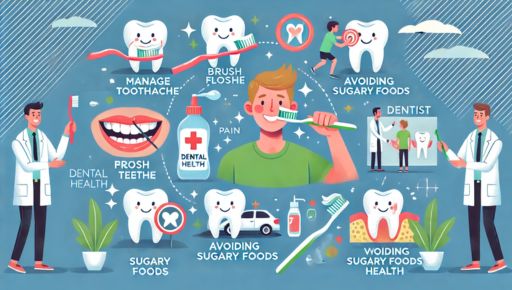
A toothache can be one of the most excruciating and persistent pains. Whether it’s a dull throb or a sharp, shooting pain, toothaches can significantly disrupt daily life. Fortunately, with the right care and attention, you can alleviate the pain and even prevent it from occurring in the first place. In this article, we will discuss common causes of toothaches, natural remedies to ease the pain, and effective prevention tips to keep your smile healthy.
Understanding the Causes of Toothache
Toothache pain is usually caused by an issue with the teeth or gums. Here are some of the most common causes:
1. Cavities or Tooth Decay
One of the leading causes of toothaches is tooth decay. Cavities form when bacteria in the mouth produce acids that erode the tooth enamel. If left untreated, cavities can penetrate deeper into the tooth, causing pain and sensitivity. Regular dental checkups can help catch cavities early before they lead to severe pain.
2. Gum Disease
Gum disease, also known as gingivitis or periodontitis, can cause inflammation, redness, and bleeding of the gums. As gum disease progresses, it can lead to toothaches, especially if the infection reaches the root of the tooth. Good oral hygiene practices, such as brushing and flossing daily, are essential for preventing gum disease.
3. Tooth Sensitivity
Some people experience toothaches due to tooth sensitivity, where the teeth react to certain triggers, such as cold drinks, hot foods, or sweet items. This is often a sign of worn enamel or receding gums. Using toothpaste designed for sensitive teeth can provide relief and reduce discomfort.
4. Abscessed Tooth
An abscessed tooth is a severe infection that occurs at the root of the tooth or in the surrounding gums. This infection leads to intense pain and may cause swelling, fever, and a bad taste in the mouth. An abscess requires immediate attention from a dentist to prevent the infection from spreading.
5. Teeth Grinding (Bruxism)
Teeth grinding, or bruxism, is another common cause of toothache. This habit can occur during sleep and put undue pressure on the teeth and jaw, leading to pain and even damage. Using a nightguard or addressing stress and anxiety can help reduce teeth grinding.
6. Impacted Wisdom Teeth
Wisdom teeth often emerge in late adolescence or early adulthood, and sometimes they don’t have enough space to emerge properly. When this happens, the teeth can become impacted, causing pain, swelling, and a potential toothache. If impacted wisdom teeth become infected, the pain can worsen. In such cases, a dentist may recommend extraction.
How to Relieve Toothache Pain
Toothache pain can range from mild to severe, but there are a variety of home remedies and treatments that can help alleviate the discomfort. Here are some practical solutions:
1. Salt Water Rinse
A salt water rinse is a simple and effective way to reduce inflammation and clean the affected area. Mix a teaspoon of salt in warm water and swish it around your mouth for 30 seconds. This can help reduce swelling and kill bacteria.
2. Over-the-Counter Pain Relievers
Non-prescription pain relievers, such as ibuprofen or acetaminophen, can provide temporary relief from toothache pain. Always follow the dosage instructions on the label and avoid taking them for extended periods without consulting a doctor.
3. Cold Compress
Applying a cold compress to the outside of your cheek near the painful tooth can help numb the area and reduce swelling. Use a clean cloth or ice pack wrapped in a towel and apply it for 15-20 minutes. Repeat as necessary, with breaks in between.
4. Clove Oil
Clove oil has been used for centuries as a natural remedy for toothache pain due to its numbing properties. Apply a small amount of clove oil to a cotton ball and gently press it against the painful area. Be cautious not to swallow any clove oil, as it can be potent and may irritate your mouth.
5. Garlic
Garlic has natural antibacterial properties that can help fight infection and reduce pain. Crush a garlic clove and mix it with salt to create a paste. Apply the paste to the affected area and leave it on for a few minutes. Garlic can also be chewed directly to help ease the pain.
6. Peppermint Tea Bags
Peppermint has a mild numbing effect that can provide relief from toothache. Steep a peppermint tea bag in hot water, then allow it to cool before applying it to the affected area. The soothing effect of peppermint can help reduce pain and inflammation.
When to Seek Professional Dental Care
While home remedies can help alleviate pain, certain situations require immediate attention from a dentist. It’s important to know when a toothache requires professional care. Here are some signs that you should seek dental attention:
1. Severe Pain
If the pain becomes unbearable or does not improve with over-the-counter pain relievers, it’s time to visit a dentist. Severe toothache pain could indicate an underlying issue, such as an abscess or nerve damage, that requires professional treatment.
2. Swelling and Fever
If you notice swelling in the face, gums, or jaw, along with a fever, it could be a sign of a serious infection. Dental infections can spread quickly, and it’s crucial to seek medical attention right away to prevent complications.
3. Persistent Sensitivity
If your toothache persists or sensitivity to hot and cold foods lasts for more than a few days, it may indicate deeper dental problems, such as cavities or gum disease. A dentist can diagnose the problem and recommend the best course of treatment.
4. Injury to the Tooth
If you’ve recently injured your tooth, such as during sports or an accident, and experience pain, you may have a cracked or fractured tooth. This requires prompt attention from a dentist to prevent further damage or infection.
How to Prevent Toothache
Prevention is always better than cure, and with the right oral hygiene practices, you can significantly reduce your risk of developing a toothache. Here are some tips to help you maintain a healthy mouth:
1. Brush and Floss Regularly
Brushing your teeth twice a day and flossing once a day are the most effective ways to prevent toothaches. This helps remove food particles and plaque that can lead to cavities and gum disease. Be sure to use fluoride toothpaste and a soft-bristled toothbrush to avoid damaging your gums.
2. Use Mouthwash
Mouthwash helps reduce bacteria in your mouth, prevent gum disease, and freshen your breath. Choose a mouthwash that contains fluoride for added protection against cavities.
3. Regular Dental Checkups
Visiting your dentist regularly for checkups and cleanings is essential for maintaining good oral health. Dentists can identify early signs of cavities, gum disease, or other issues that could lead to toothaches.
4. Avoid Sugary Foods and Drinks
Excessive sugar consumption contributes to tooth decay and cavities. Try to limit your intake of sugary foods and drinks, especially between meals. If you do consume sugary items, brush your teeth afterward to reduce the risk of tooth decay.
5. Wear a Mouthguard for Teeth Grinding
If you grind your teeth at night, consider wearing a custom mouthguard to protect your teeth from wear and tear. A dentist can help you choose the right mouthguard to fit your mouth and prevent damage.
6. Stop Smoking
Smoking is a significant risk factor for gum disease and other oral health problems. Quitting smoking can improve your oral health and reduce your chances of experiencing toothaches.
Conclusion
A toothache is never a pleasant experience, but with the right care and attention, you can manage the pain and prevent it from occurring in the future. If you’re experiencing persistent or severe tooth pain, don’t hesitate to consult with a dentist for a thorough examination. Remember, good oral hygiene, regular dental visits, and a healthy lifestyle are the keys to maintaining a pain-free smile!
